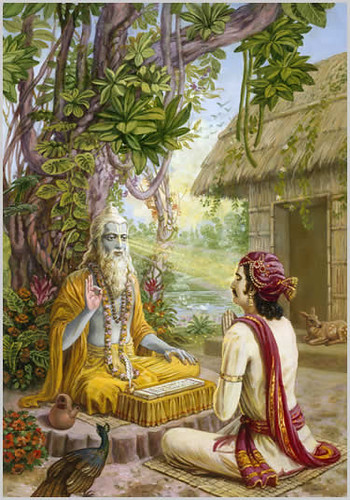Summary by HG Narayani Mataji:
Verses 1-3: Mangalacarana
Srimad
Bhagavatam, the ripened fruit of the desire tree of the Vedas, glorifies the
Lord, the Supreme Personality of Godhead, Absolute Truth, and reservoir of all
rasas. All cheating religious activities are completely rejected from the
Bhagavatam, and the highest truth of Lord is revealed. Pure hearted souls who
submissively drink the Bhagavatam from the lips of Sukadeva, will soon capture
Krsna within their hearts.
janamady asya yatah - SB 1.1.1 - Meditate on Lord Krishna
dharmah projjhita-kaitavo 'tra SB 1.1.2
Introspection:
am I attached to any of the cheating religions? what hole am I trying to fill through them?
How can I help myself to do away with them?
Verses 4-8: The sages worship Suta
Great
sages headed by the sage Saunaka assembled at Naimisaranya to perform a
thousand-year sacrifice for the satisfaction of the Lord and His devotees. They
first glorified Suta as being pure, knowledgeable, experienced in hearing and
chanting, and blessed by his spiritual
master.
Introspection:
A humility activity: Go through the qualities presented in these verses and make a note of what is going well with you and what are the areas of improvement
Verses 9-13: The sages ask
questions
Understanding
the spiritual disqualifications of people in this age, the sages ask relevant
questions. They especially desire to know what is the ultimate good for the
people in general and what is the essence of all the various scriptures. They
are also very eager to hear about Lord Krsna.
Six Questions- Six Answers
What is wrong with Kali Yuga?
Verses 14-20: Holy name and
devotees
The sages
then glorify chanting the holy names, associating with pure devotees and
hearing Srimad Bhagavatam. They express their eagerness to hear of the
incarnations of Lord Krsna.
Introspection:
How do I view the Holy Name, the devotees and the process of hearing?
Verses 21-23 Spiritual master
The sages
affirm their determination to perform the sacrifice of hearing the glories of
the Lord, accepting Suta as the captain of the ship to take them across the
difficult ocean of Kali. Their final question is where to find religious
principles in this age, since Lord Krsna departed for His own abode.
In this chapter the sages pose 6 questions to Suta Goswami who answers them throughout the course of Srimad Bhagavatam. The 6 questions and their answers are linked below:
6 questions 6 answers
6 questions 6 answers
